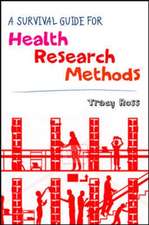Encyclopedia of Psychopharmacology
Editat de Ian P. Stolerman Lawrence H. Priceen Limba Engleză Hardback – 8 apr 2015
The aim of this comprehensive encyclopedia is to provide detailed information on psychopharmacology and its sub-disciplines, such as clinical psychopharmacology, molecular neuropsychopharmacology, behavioral pharmacology in laboratory animals, preclinical psychopharmacology, and human experimental psychopharmacology.
The wide-ranging entries in the Encyclopedia of Psychopharmacology are written by leading experts drawn from a broad diversity of backgrounds and areas of specialization. The entries, comprehensive but succinct, provide basic and clinical scientists in academia, as well as industry, with the most important and relevant information on recent developments in psychopharmacology and its closely allied disciplines. The essential information about the field contained in these entries is readily accessible to clinicians, scholars, students, teachers, and interested laypeople.
Preț: 6582.51 lei
Preț vechi: 6928.96 lei
-5% Nou
Puncte Express: 9874
Preț estimativ în valută:
1259.73€ • 1310.31$ • 1039.97£
1259.73€ • 1310.31$ • 1039.97£
Carte tipărită la comandă
Livrare economică 10-16 aprilie
Preluare comenzi: 021 569.72.76
Specificații
ISBN-13: 9783642361715
ISBN-10: 3642361714
Pagini: 1918
Ilustrații: 1918 p. 216 illus., 91 illus. in color. In 2 volumes, not available separately.
Dimensiuni: 178 x 254 x 121 mm
Greutate: 3.77 kg
Ediția:2nd ed. 2015
Editura: Springer Berlin, Heidelberg
Colecția Springer
Locul publicării:Berlin, Heidelberg, Germany
ISBN-10: 3642361714
Pagini: 1918
Ilustrații: 1918 p. 216 illus., 91 illus. in color. In 2 volumes, not available separately.
Dimensiuni: 178 x 254 x 121 mm
Greutate: 3.77 kg
Ediția:2nd ed. 2015
Editura: Springer Berlin, Heidelberg
Colecția Springer
Locul publicării:Berlin, Heidelberg, Germany
Public țintă
Professional/practitionerCuprins
Abuse Liability Evaluation.- Acamprosate.- Acetylcholinesterase and Cognitive Enhancement.- Active Avoidance.- Addictive Disorder: Animal Models.- Adjustment Disorders.- Adolescence and Responses to Drugs.- Aggression.- Aggressive Behavior: Clinical Aspects.- Agoraphobia.- Alcohol.- Alcohol Abuse and Dependence.-Alcohol and Drug Dependence Treatment: Pharmacogenetics.- Alcohol Preference Tests.- Alcohol-Related Neurodevelopmental Disorder.- Amine Depletors.- Aminergic Hypotheses for Depression.- Aminergic Hypothesis for Schizophrenia.-Analgesics.- Animal Models for Psychiatric States.- Anticonvulsants.- Antidepressants.- Antidepressants: Recent Developments.- Antinociception Test Methods.- Anti-Parkinson Drugs.- Antipsychotic Drugs.- Antipsychotic Medication: Future Prospects.- Antisense Oligonucleotides.- Anxiety: Animal Models.- Apoptosis.- Appetite Stimulants.- Appetite Suppressants.- Arginine-Vasopressin.-Atomoxetine.- Attention.- Attention Deficit and Disruptive Behavior Disorders.- Attention Deficit Hyperactivity Disorders: Animal Models.- Attentional Bias to Drug Cues.- Atypical Depression.- Autism Spectrum Disorders and Intellectual Disability.- Autism: Animal Models.- Barbiturates.- Behavioral Despair.- Behavioral Economics.- Behavioral Flexibility: Attentional Shifting, Rule Switching and Response Reversal.- Behavioral Tolerance.- Benzodiazepines.- Beta-Adrenoceptor Antagonists.- Bipolar Disorder.- Bipolar Disorder in Children.- Blocking, Overshadowing and Related Concepts.- Blood-Brain Barrier.- Brain-Derived Neurotrophic Factor.- Caffeine.- Caffeine Intoxication.- Cannabinoids and Endocannabinoids.- Cannabis Use Disorders.- Cholecystokinins.- Circadian Rhythms.- Classical (Pavlovian) Conditioning.- Classical Conditioning and Psychoactive Drugs.- Classification of Psychoactive Drugs.- Cocaine.- Cocaine Dependence.- Cognitive Enhancers: Role of the Glutamate System.- Comorbid Insomnia.- Conditioned Drug Effects.- Conditioned Place Preference and Aversion.- Conditioned Taste Aversions.- Conditioned Taste Preferences.- Consolidation and Reconsolidation.- Contingency Management in Drug Dependence.- Corticotropin-Releasing FactorD-cycloserine.- Declarative and Non-Declarative Memory.- Delayed Onset of Drug Effects.- Delirium.- Delusional Disorder.- Dementias and Other Amnestic Disorders.- Dementias: Animal Models.- Depression: Animal Models.- Depression: Response and Remission.- Depressive Disorders in Children.- Depressive Disorders: Major, Minor, and Mixed.- Dissociative Anesthetics.- Distress Vocalization.- Disulfiram.- Driving and Flying Under Influence of Drugs.- Drug Discrimination.- Drug Interactions.- Dysthymic Disorder (Persistent Depressive Disorder).- Eating and Appetite.- Eating Disorder: Anorexia Nervosa.- Eating Disorders: Animal Models.- Eating Disorders: Binge-Eating.- Electrochemical Techniques and Advances in Psychopharmacology.- Electroencephalography.- Elevated Plus Maze.- Emotion and Mood.- Environmental Enrichment and Drug Action.- Epigenetics.- Ethical Issues in Animal Psychopharmacology.- Ethical Issues in Human Psychopharmacology.- Ethopharmacology.- Event-Related Potentials.- Excitatory Amino Acids and Their Antagonists.- Expectancies and Their Influence on Drug Effects.- Extracellular Recording.- Eye Movement Tasks.- Fetal Alcohol Spectrum Disorders.- First-Generation Antipsychotics.- Fragile X Syndrome.- Functional Scales.- Generalized Anxiety Disorder.- Genetically Modified Animals.- Habituation.- Hallucinations.- Hallucinogen Abuse and Dependence.- Hallucinogens.- Herbal Remedies.- High Pressure Liquid Chromatography.- Histaminic Agonists and Antagonists.- Histone Deacetylase Inhibitors.- History of Psychopharmacology.- Hypersomnias.- Hypocretins.- Illness Anxiety Disorder, Somatic Symptom Disorder, and Body Dysmorphic Disorder.- Impulse Control Disorders.- Impulsivity.- Incubation of Drug-Seeking.- Induced Pluripotent Stem Cells.- Inhalant and Solvent Abuse.- Inhibition of Memory.- Inhibitory Amino Acids and Their Receptor Ligands.- Insomnias.- Instrumental Conditioning.- Inter-Temporal Choice.- Intracellular Recording.- Intracranial Self-Stimulation.- Inverse Agonists.- Ketamine.- Khat.- Kinase Inhibitors.-Latent Inhibition.- Learning and Memory: Molecular Mechanisms.- Legal Aspects of Psychopharmacology.- Leptin.- Licensing and Regulation of Medicines in the UK.- Lipophilicity.- Liquid Diet for Administering Alcohol.- Lithium.- Long-Term Depression and Memory.- Long-Term Potentiation and Memory.- Magnetic Resonance Imaging.- Magnetic Resonance Imaging (Functional).- Medication Adherence.- Methylenedioxymethamphetamine (MDMA).- Methylphenidate and Related Compounds.- Microdialysis.- Microiontophoresis and Related Methods.- Mild Cognitive Impairment.- Modafinil.- Monoamine Oxidase Inhibitors.- Mood Stabilizers.- Motor Activity and Stereotypy.- Movement Disorders Induced by Medications.-Muscarinic Cholinergic Receptor Agonists and Antagonists.- NARI Antidepressants.- Nerve Growth Factor.- Neuroactive Steroids.- Neurodegeneration and Its Prevention.- Neuroendocrine Markers for Drug Action.- Neurogenesis.- Neuroprotectants: Novel Approaches for Dementias.- Neuroprotection.- Neurotensin.- Neurotoxicity and Schizophrenia.- Neurotoxins.- Nicotine.- Nicotine Dependence and Its Treatment.- Nicotinic Agonists and Antagonists.- Non-Benzodiazepine Agonists.- Obsessive-Compulsive Anxiety Disorders.- Obsessive-Compulsive Anxiety Disorders in Childhood.- Occasion Setting with Drugs.- Open-Field Test.- Operant Behavior in Animals.- Opioid Dependence and Its Treatment.- Opioids.- Optogenetics.- Oxytocin.- Pain and Psychopharmacology.- Panic.- Parasomnias.- Passive Avoidance.- Pathological Gambling.- Pavlovian Fear Conditioning.- Pediatric Schizophrenia.- Perinatal Exposure to Drugs.- Perinatal Use of Antidepressants.- Personality: Neurobehavioural Foundation and Pharmacological Protocols.- Pharmaceutical Cognitive Enhancers: Neuroscience and Society.- Pharmacodynamic Tolerance.- Pharmacogenetics.- Pharmacokinetics.- Phenotyping of Behavioral Characteristics.- Phenylalanine and Tyrosine Depletion.- Phosphodiesterase Inhibitors.- Placebo Effect.- Platelets.- Positron Emission Tomography (PET) Imaging.- Postpsychotic Depressive Disorder of Schizophrenia.- Premenstrual Dysphoric Mood Disorder.- Pre-psychotic States and Prodromal Symptoms.- Prepulse Inhibition.- Primate Models of Cognition.- Protein Synthesis and Memory.- Proteomics.- Psychomotor Performance in Humans.- Psychophysiological Methods.- Psychostimulant Dependence and Its Treatment.- Psychostimulants.- Punishment Procedures.- Randomized Controlled Trials.- Rate-Dependency Theory.- Rating Scales and Diagnostic Schemata.- Receptors: Binding Assays.- Receptors: Functional Assays.- Recurrent Brief Depressive Disorder.- Reinforcement Disorders.- Reinstatement of Drug Self-Administration.-Ritual Uses of Psychoactive Drugs.- Rodent Tests of Cognition.- Schizoaffective Disorder.- Schizophrenia.- Schizophrenia: Animal Models.- Schizophrenia: Cognitive Impairment.- Schizophrenia: Management of Treatment-Resistance.- Schizophrenia: Remission.- Schizophrenia: Violent Behavior.- Schizotypal Personality Disorder.- Second- and Third-Generation Antipsychotics.- Sedative, Hypnotic, and Anxiolytic Dependence.- Self-Administration of Drugs.- Sensitization to Drugs.- Serotonin Syndrome.- Sex Differences in Drug Effects.- Sex Hormones.- Sexual Behavior.- Sexual Disorders.- Short-Term and Working Memory in Animals.- Short-Term and Working Memory in Humans.- Sign-Tracking.- SNRI Antidepressants.- Social Anxiety Disorder.- Social Behavior.- Social Stress.- Somatostatin.- Spatial Learning in Animals.- Spatial Memory in Humans.- SPECT Imaging.- SSRIs and Related Compounds.- State Dependence of Memory.- State Dependent Learning and Memory.- Stress: Influence on Relapse to Substance Use.- Substance Use Disorders: A Theoretical Framework.- Suicide.- Synaptic Plasticity.- Tachykinins.- Therapeutic Drug Monitoring.- Tic Disorders with Childhood Onset.- Timing Behavior.- Trace Amines.- Transcranial Magnetic Stimulation.- Translational Research in Drug Discovery.- Trauma- and Stressor-Related Disorders.- Traumatic Brain Injury and Psychopharmacology.- Trichotillomania (Hair-Pulling Disorder).- Trier Social Stress Test.- Tryptophan Depletion.- Ultrasonic Vocalizations.- Vaccines and Drug-Specific Antibodies.- Verbal and Non-Verbal Learning in Humans.- Wakefulness.- Withdrawal Syndromes.
Recenzii
“This is, as before, a well-presented, well thought-out, up-to-date reference book on an important subject, which can be thoroughly recommended to its potential readers. … All academic libraries catering for postgraduate study or research in the neurosciences in general, and psychopharmacology in particular, can be warmly recommended to consider this book … .” (Martin Guha, Reference Reviews, Vol. 29 (8), 2015)
“This is a very comprehensive atlas and text (one-volume) concerning psychoneuropharmacology in human trials and animal studies. … This is a perfect textbook for psychiatrists, psychopharmacologists, researchers, neuropharmacologists, fellows, residents, neurologists, and medical students involved in psychopharmacology work in the laboratory and the clinic.” (Joseph J. Grenier, Amazon.com, April, 2015)
“This is a very comprehensive atlas and text (one-volume) concerning psychoneuropharmacology in human trials and animal studies. … This is a perfect textbook for psychiatrists, psychopharmacologists, researchers, neuropharmacologists, fellows, residents, neurologists, and medical students involved in psychopharmacology work in the laboratory and the clinic.” (Joseph J. Grenier, Amazon.com, April, 2015)
Notă biografică
Ian Stolerman received the BPharm degree of the School of Pharmacy, University of London, in 1964 and a Ph.D. in Psychopharmacology at University College London in 1969. This was followed by postdoctoral experience at the Albert Einstein College of Medicine (New York) and the University of California, Los Angeles. He then moved to Birmingham to become a member of the Medical Research Council Neuropharmacology Unit. In 1980 he relocated to the Institute of Psychiatry, London as a member of the MRC External Scientific Staff. He headed the Institute’s Section of Behavioural Pharmacology and was co-chair of the its addictions Interdisciplinary Research Group. His research included studies on nicotine and on mixtures of psychoactive drugs and was funded primarily by the UK Medical Research Council, the US National Institute on Drug Abuse and the Wellcome Trust. Ian Stolerman was a founder of the European Behavioural Pharmacology Society and became its first President in 1986. He received the title Professor of Behavioural Pharmacology in 1995. From 1992 to 2005 he served as Co-Editor of the journal Drug and Alcohol Dependence. He was also on the Councils of the British Association for Psychopharmacology and the Research Defence Society, was President of the International Society of Addiction Journal Editors and of the Society for Stimulus Properties of Drugs. Ian Stolerman established the Drug Discrimination Database, a unique research tool for both students and research professionals interested in the neurobiological bases of addiction, that was funded for nearly 30 years by the US National Institute on Drug Abuse. In 2008 the Institute of Psychiatry, King’s College London, honored him with the title of Emeritus Professor of Behavioural Pharmacology. He was the Editor-in-Chief of the first edition of the Encyclopedia of Psychopharmacology (2010).
Lawrence Price attended the University of Michigan, where he received a B.S. with highest honors in psychology and high distinction in 1974, followed by an M.D. in 1978. After an internship in internal medicine at Norwalk Hospital in Norwalk, Connecticut, he completed residency and fellowship training in psychiatry at Yale University. From 1982 until 1996, he was on the faculty in the Department of Psychiatry at Yale University, serving as Associate Professor and Director of the Clinical Neuroscience Research Unit at the Connecticut Mental Health Center in New Haven, Connecticut. Since 1996, he has been Professor of Psychiatry and Human Behavior at Brown University. From 1996 until 2012, he was Clinical Director, Director of Research, and Chair of the Institutional Review Board at Butler Hospital in Providence, Rhode Island, subsequently serving as Chief Medical Officer from 2012 until 2014. He is currently President of Butler Hospital and Executive Chief of the Brain and Behavioral Health Service Line of Care New England. Dr. Price’s primary research interests have involved the phenomenology, clinical psychopharmacology, neuropharmacology, and neurobiology of mood, anxiety, and addictive disorders. He has published nearly 450 scientific papers, and was identified by the Institute for Scientific Information as one of the top ten authors of high-impact papers in psychiatry from 1990 to 1999. A Distinguished Fellow of the American Psychiatric Association and a Fellow of the American College of Neuropsychopharmacology, he is one of the principal developers of the Yale-Brown Obsessive-Compulsive Scale (Y-BOCS), the standard assessment tool for OCD. In addition to his research activities, Dr. Price has received numerous awards for his teaching, mentoring, and clinical work, and is Editor of The Brown University Psychopharmacology Update and a Principal Editor for clinical psychopharmacology of Psychopharmacology.
Lawrence Price attended the University of Michigan, where he received a B.S. with highest honors in psychology and high distinction in 1974, followed by an M.D. in 1978. After an internship in internal medicine at Norwalk Hospital in Norwalk, Connecticut, he completed residency and fellowship training in psychiatry at Yale University. From 1982 until 1996, he was on the faculty in the Department of Psychiatry at Yale University, serving as Associate Professor and Director of the Clinical Neuroscience Research Unit at the Connecticut Mental Health Center in New Haven, Connecticut. Since 1996, he has been Professor of Psychiatry and Human Behavior at Brown University. From 1996 until 2012, he was Clinical Director, Director of Research, and Chair of the Institutional Review Board at Butler Hospital in Providence, Rhode Island, subsequently serving as Chief Medical Officer from 2012 until 2014. He is currently President of Butler Hospital and Executive Chief of the Brain and Behavioral Health Service Line of Care New England. Dr. Price’s primary research interests have involved the phenomenology, clinical psychopharmacology, neuropharmacology, and neurobiology of mood, anxiety, and addictive disorders. He has published nearly 450 scientific papers, and was identified by the Institute for Scientific Information as one of the top ten authors of high-impact papers in psychiatry from 1990 to 1999. A Distinguished Fellow of the American Psychiatric Association and a Fellow of the American College of Neuropsychopharmacology, he is one of the principal developers of the Yale-Brown Obsessive-Compulsive Scale (Y-BOCS), the standard assessment tool for OCD. In addition to his research activities, Dr. Price has received numerous awards for his teaching, mentoring, and clinical work, and is Editor of The Brown University Psychopharmacology Update and a Principal Editor for clinical psychopharmacology of Psychopharmacology.
Caracteristici
Updated and expanded: All entries have been revisited and the work has been expanded by 25%
Updated according to DSM-V, the Diagnostic and Statistical Manual of Mental Disorders (DSM) of the American Psychiatric Association
Comprehensive and up-to-date coverage of psychopharmacology, from the fundamentals to the most recent findings
More than 2000 entries, from detailed essays and reviews of cutting edge research to keyword definitions
Written by some 250 international contributors, under an editorial board of leading experts
Over 500 color illustrations demonstrate complex processes and concepts
Includes supplementary material: sn.pub/extras
Updated according to DSM-V, the Diagnostic and Statistical Manual of Mental Disorders (DSM) of the American Psychiatric Association
Comprehensive and up-to-date coverage of psychopharmacology, from the fundamentals to the most recent findings
More than 2000 entries, from detailed essays and reviews of cutting edge research to keyword definitions
Written by some 250 international contributors, under an editorial board of leading experts
Over 500 color illustrations demonstrate complex processes and concepts
Includes supplementary material: sn.pub/extras








